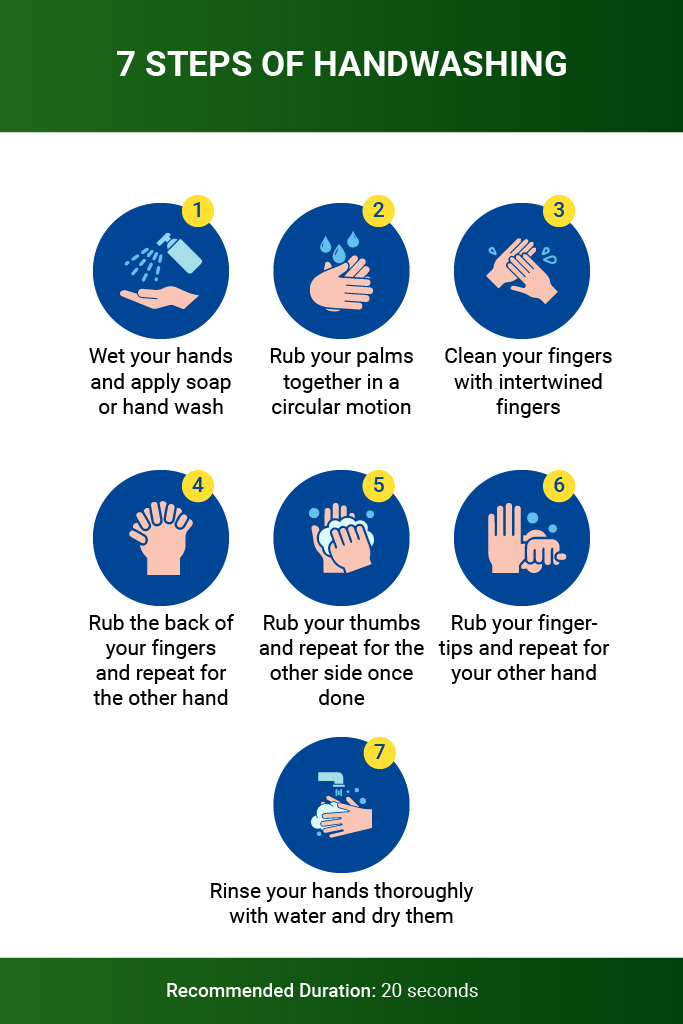7 steps for the most effective hand washing experience
Proper hand washing is an easy yet extremely important and effective way to stop germs, bacteria, viruses, and infectious diseases from spreading through your hands.
Most diseases are usually spread through contaminated hands. Therefore, proper hand
washing is essential regardless of the circumstances, time, or place. But, it carries even greater significance in some places, such as hospitals, washrooms, and clinics.
According to researches, proper hand washing reduces the risk of respiratory and gastrointestinal infections by up to 23 and 48 percent, respectively.
Even though countless medical experts and organizations have continuously spread awareness regarding the importance of proper hand washing, many people still do not know how important and effective hand washing is for a healthy immune system.
In this article, we will look at the steps for the most effective hand washing technique, so you can protect yourself and the people around you from getting infected.
Why is proper hand washing important?
Your hands come in contact with different surfaces several times throughout the day. This makes them the ideal and primary carriers of germs, bacteria, and viruses.
These pathogens can stay alive on your hands for up to three hours. In addition, if not taken care of, they can quickly become responsible for critical diseases such as typhoid and food poisoning.
Washing your hands with antibacterial soap or liquid handwash is vital to ensure that your hands remain clean and protected from such pathogens, thus preventing various infections and diseases.
However, if soap and water are unavailable, using a hand sanitizer that promises to eliminate 99.99% of germs is also a viable option.
When should you wash your hands?
Knowing when to wash your hands is equally important as knowing how to wash your hands properly.
Here is a list of scenarios where washing your hands with antibacterial soap or antibacterial liquid hand wash is highly advised.
Before & After
- Eating or preparing food
- Taking medications
- Treating an injury (cut, wound, etc.)
- Visiting or taking care of a sick individual
After
- Coughing
- Sneezing
- Using bathroom
- Handling raw food items (meat or vegetables)
- Coming back from outside
- Touching surfaces that are visibly dirty
- Handling a pet
- Cleaning the house, office, or any other place
- Touching surfaces that are frequently touched
7 Steps of Handwashing

Below is the seven-step handwashing technique endorsed by the CDC and World Health Organization (WHO):
- Wet your hands with water (preferably warm) and apply antibacterial soap or antibacterial liquid handwash. Make sure to create enough lather to cover your entire hands and wrists.
- Rub your palms together in a circular motion to initiate the scrubbing method. Place your right palm over the back of your left hand and rub with your fingers intertwined. After that, repeat the same method with your left palm over your right hand’s back.
- Clean between your fingers by rubbing your palms together with intertwined fingers.
- It’s time to clean the back of your fingers! First, rub the back of your fingers. Then, rub them against your palms and repeat the same method for the other hand.
- Now, rub your thumbs. Clean around your thumb by covering one hand over the other and caressing in a rotational motion. Repeat the same method for the other side once you’re done.
- Lastly, rub your fingertips on the palm of the opposite hand in a circular movement. Repeat the same method for your other hand.
- Rinse your hands thoroughly with water and dry them.
The Bottom Line
Effective hand washing is a crucial component of your personal hygiene process. It protects against countless germs and bacteria that can easily be transmitted into your body through your hands.
Governments and medical institutes have repeatedly called for strict and collective efforts to enhance hand hygiene practices.
However, good hand hygiene must be practiced consistently and mindfully to have the most significant effect on individual, community, and global health.
